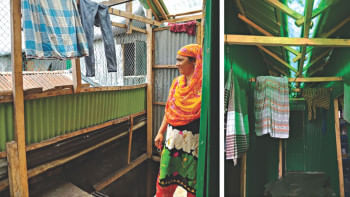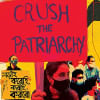Navigating masculinities in Dhaka’s slums

In the slums of Kallyanpur, boys as young as six years old can be seen working in the scrap trade, breaking down junk for a small amount of money. During the January cold wave, they can be spotted huddling around a plastic flame, using their nimble fingers to separate usable parts from the waste. Without fully comprehending the magnitude of their suffering, they rise to the challenge of providing for their impoverished families. This harsh reality affects the lives of numerous adolescent boys and young men in the urban slums of Dhaka.
Jashim has been working in the scrap trade since he was just 14, and the weight of years of sifting through junk is evident; now, at 20 years old, he looks much older than his age. He flashes a sad smile as he recalls his family's migration to Dhaka. "We moved to this slum after the river took all we had. My father started a tea stall, but he fell sick when I was preparing for my SSC. He could not work as much, and we were struggling. As the eldest son, it was my duty to step up—I had to be the man of the house."
While poverty defines much of the lives of boys and young men like Jashim in the slums of Dhaka, their ideas of manhood and masculinity play a particularly important role in shaping how they experience this life within structural and social disparities.
The burden of traditional gender roles creates a conflict for these young individuals in the slums: their reality prevents them from attaining the masculine ideals they aspire to. When they fail, they are left on their own to face the consequences.
Bangladesh's pursuit of modernisation and development has brought about social transformations that have impacted various aspects, including gender relations and power dynamics. Although there has been significant progress in promoting women's rights and freedoms, gender roles are still primarily influenced by patriarchal values in the country. Patriarchy, an ancient institution founded on the systematic subjugation of women, views power in gender dynamics as a zero-sum game. This means that the privileges enjoyed by one group, traditionally men, are contingent on the oppression of others.
However, not all men are equal under the patriarchy—some men are dispensable, particularly those from poor socioeconomic backgrounds. On the one hand, men hold significant privileges and benefits as they continue to derive different forms of power and control from the existing gender structures. On the other hand, they face considerable pressures to conform to idealised societal expectations of masculinity, such as being providers and protectors, and the inability to fulfil these roles results in humiliation and emasculation. Failing to fulfil expected gender roles in poor socioeconomic conditions leads to experiences of inner turmoil that many men struggle to deal with. In slums and informal spaces, in particular, men find themselves in uneasy positions where rampant structural deficiencies prevent them from realising the social expectations of manhood that they strive towards.
For most, probing into the different aspects of their lives—ranging from their domestic situation and future prospects to their relationships and inner feelings of anguish—reveals an unhealthy sense of discontent. The situation at home is often riddled with instability. Men feel that they bear the sole responsibility of being the breadwinner and provider of a decent life for their families. However, with packed households facing financial crunches stemming from insecure incomes due to a lack of good jobs, men struggle to meet this responsibility. In the cases where working wives supplement the family income, the men are often wrought with feelings of emasculation and resentment. Domestic conflicts stemming from frustrations of all these feelings are common in the slums.
The outside world proves to be not much kinder. With over four million people reported to be living in Dhaka slums, there is a scramble for the limited available resources and services. This struggle worsened after the pandemic, as poverty in Bangladesh increased from 21.6 percent in 2018 to 42 percent in 2020. Poverty in the slums leads many young boys to drop out of school and seek work. Some may show promise in their studies, but they are often left disappointed because of the many barriers to realising their potential. Young men reported similar struggles when it came to employment prospects due to a lack of job opportunities. The barriers in education and work opportunities in the slums trap boys and young men in cycles of poverty, reinforcing feelings of powerlessness and inadequacy that affect their perceptions of manhood.
The burden of traditional gender roles creates a conflict for these young individuals in the slums: their reality prevents them from attaining the masculine ideals they aspire to. When they fail, they are left on their own to face the consequences. Jashim's story is in many ways exemplary of this experience. He talks about the sacrifices he had to make to prioritise his family over his well-being. "When I was younger, I wanted to work on a ship and travel the world. But I knew that I had to work to support my family. As the eldest son, it is my responsibility to look after my parents. Who else would do it?"
When they fail to live up to what is expected of them, men often struggle with feelings of inadequacy and significant emotional stress. They suppress these emotions as they feel that sharing feelings is a sign of weakness for men. Burying the pain within, they find themselves stuck in a miserable loop of striving and failing to reach the manhood they so desire.
These struggles of fitting into the assigned box of patriarchal masculine norms have serious consequences. The experiences of young boys and men in the slums indicate an urgent need to reflect on the types of narrative shifts required in how gender norms are approached and addressed, particularly in marginalised contexts. Current interventions need to incorporate an understanding of the complexities of masculine identity and the emotional toll it exacts on young boys and men in precarious socioeconomic conditions. Such narrative shifts are critical to create more sustainable transformations in gender roles across families, communities and institutions.
Moving forward, it is imperative to strive towards creating a narrative that transcends the confines of traditional gender roles, offering boys and young men in the slums a pathway towards redefining masculinity on their terms. By promoting a culture of openness and vulnerability, we can empower individuals to confront their innermost struggles without fear of judgement or stigma. Only then can we truly pave the way for a more equitable and compassionate society—one where every individual is allowed to thrive and realise their fullest potential.
This op-ed is based on the insights from qualitative research on men and masculinities' role in anti-feminist backlash conducted under the action-research programme "Countering Backlash, Reclaiming Gender Justice," led by the Institute of Development Studies at the University of Sussex and funded by Sida.
Raiyaan Mahbub is senior research assistant at BRAC James P Grant School of Public Health, BRAC University.
Views expressed in this article are the author's own.
Follow The Daily Star Opinion on Facebook for the latest opinions, commentaries and analyses by experts and professionals. To contribute your article or letter to The Daily Star Opinion, see our guidelines for submission.

 For all latest news, follow The Daily Star's Google News channel.
For all latest news, follow The Daily Star's Google News channel. 










Comments